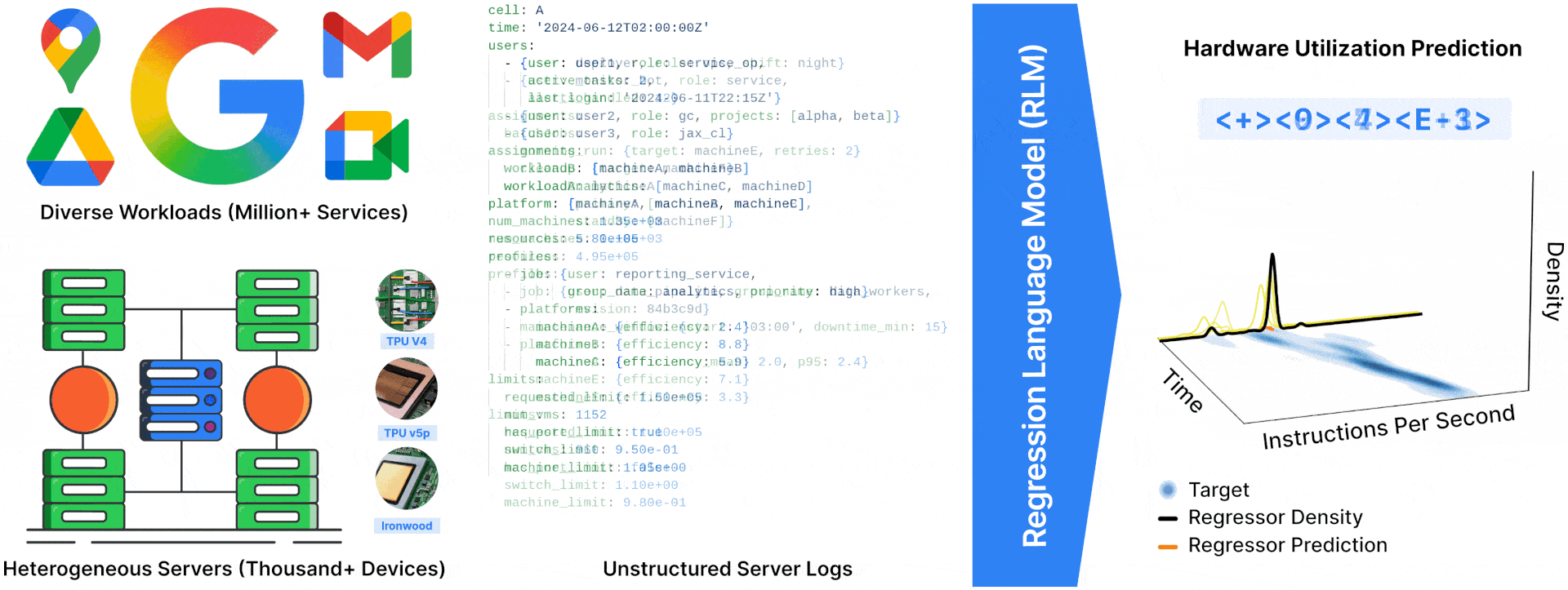Google Research Blog | Setup | Usage | Extended Usage | Citing
RegressLM is a library for text-to-text regression, applicable to any input string representation and allows pretraining and fine-tuning over multiple regression tasks.
Example Application: Directly regressing performance metrics from unstructured, textually represented system states from Google's massive compute clusters.Get started by installing the core libraries:
pip install -e .
To run e.g. T5Gemma variants, install additional libraries:
pip install ".[extras]"
There are two main stages: inference and pretraining (optional).
The intended use-case is to import a RegressLM class, which can decode floating-point predictions from a given input, and also fine-tune against new data.
from regress_lm import core
from regress_lm import rlm
# Create RegressLM with max input token length.
reg_lm = rlm.RegressLM.from_default(max_input_len=2048)
# Example (x,y) pairs, which can be fine-tuned against.
examples = [core.Example(x='hello', y=0.3), core.Example(x='world', y=-0.3)]
reg_lm.fine_tune(examples)
# Query inputs.
query1, query2 = core.ExampleInput(x='hi'), core.ExampleInput(x='bye')
samples1, samples2 = reg_lm.sample([query1, query2], num_samples=128)To produce better initial checkpoints for transfer learning, we recommend the user pretrains over large amounts of their own training data. Example pseudocode with PyTorch:
from torch import optim
from regress_lm.models.pytorch import model as torch_model_lib
model = torch_model_lib.PyTorchModel(...)
optimizer = optim.Adafactor(
filter(lambda p: p.requires_grad, model.parameters()), lr=1e-4
)
for _ in range(...):
examples = [Example(x=..., y=...), ...]
tensor_examples = model.convert(examples)
optimizer.zero_grad()
loss, _ = model.compute_loss_and_metrics(tensor_examples)
loss.backward()
optimizer.step()Below, we describe ways to improve performance and extended applications.
You can generate a custom vocabulary, trained on an offline corpus of data
mydata.txt:
encoder_vocab = SentencePieceVocab.from_corpus(corpus_path='mydata.txt', vocab_size=1024)Larger model sizes may increase performance, although with more computational cost:
model = PyTorchModel(num_encoder_layers=12, num_decoder_layers=12)The RLM can decode a concatenated sequence of tokens too, for multi-objective regression:
reg_lm = rlm.RegressLM.from_default(max_num_objs=2)
# Examples can have variable objective lengths.
examples = [core.Example(x='hello', y=[0.2]), core.Example(x='world', y=[-0.2, 0.3])]
reg_lm.fine_tune(examples)
# Now `samples` has shape (128, 2).
samples = reg_lm.sample([core.ExampleInput(x='hi')], num_samples=128)[0]T5Gemma frozen encoder + our default decoder is supported:
reg_lm = rlm.RegressLM.from_t5gemma_encoder('google/t5gemma-s-s-prefixlm')End-to-end T5Gemma is also supported:
from regress_lm.models.pytorch import t5gemma_model
model = t5gemma_model.T5GemmaModel('google/t5gemma-s-s-prefixlm')To support 100K+ input token lengths, alternative encoders (e.g.
mamba-ssm and Performer) are supported:
model = PyTorchModel(encoder_type='mamba', additional_encoder_kwargs={'d_state': 128})
model = PyTorchModel(encoder_type='performer', additional_encoder_kwargs={'num_features': 256})The codebase was written by: Xingyou Song, Yash Akhauri, Dara Bahri, Michal Lukasik, Arissa Wongpanich, Adrian N. Reyes, and Bryan Lewandowski.
If you find this project useful, please consider citing the relevant works:
@article{performance_prediction,
title={Performance Prediction for Large Systems via Text-to-Text Regression},
author={Yash Akhauri and Bryan Lewandowski and Cheng-Hsi Lin and Adrian N. Reyes and Grant C. Forbes and Arissa Wongpanich and Bangding Yang and Mohamed S. Abdelfattah and Sagi Perel and Xingyou Song},
journal={arXiv preprint arXiv:2506.21718},
year={2025}
}
@article{omnipred,
title={OmniPred: Language Models as Universal Regressors},
author={Xingyou Song and Oscar Li and Chansoo Lee and Bangding Yang and Daiyi Peng and Sagi Perel and Yutian Chen},
journal={Trans. Mach. Learn. Res.},
year={2024},
url={https://openreview.net/forum?id=t9c3pfrR1X},
}
@article{decoding_regression,
title={Decoding-based Regression},
author={Xingyou Song and Dara Bahri},
journal={Trans. Mach. Learn. Res.},
year={2025},
url={https://openreview.net/forum?id=avUQ8jguxg},
}
Disclaimer: This is not an officially supported Google product.
